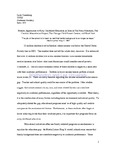| dc.rights.license | In Copyright | en_US |
| dc.creator | Greenberg, Leah | |
| dc.date.accessioned | 2013-12-18T13:46:24Z | |
| dc.date.available | 2013-12-18T13:46:24Z | |
| dc.date.created | 2005 | |
| dc.identifier | WLURG38_Greenberg_POV_2005_wm | |
| dc.identifier.uri | http://hdl.handle.net/11021/26017 | |
| dc.description | Leah Greenberg is a member of the Class of 2005 of Washington and Lee University. | en_US |
| dc.description | Capstone; [FULL-TEXT FREELY AVAILABLE ONLINE] | en_US |
| dc.description.abstract | Simple educational preschool programs are often not enough to compensate for the negative aspects of poverty. Evidence from “compensatory and regular preschool programs generally indicates weak and inconsistent effects on IQ and achievement” (Armor, 95). The results for programs that incorporate family support initiatives are much stronger. This is because problems associated with poverty and poor parenting can be harmful to children's emotional health. Poor emotional health can have the same negative impact on cognitive development as poor physical health. E.C. Frede writes that the most beneficial early childhood programs are those which combine a number of different factors. These include “class size, the ratio of children to teachers…reflective teaching practice and close relationships with parents, and curricula that serve as a bridge between home and school” (95). I will first address programs that deal with children's health. Next, I will look at classroom dynamics and different methods of teaching. Finally I will examine different programs which involve a parental aspect. [From introductory section] | en_US |
| dc.description.statementofresponsibility | Leah Greenberg | |
| dc.format.extent | 28 pages | en_US |
| dc.language.iso | en_US | en_US |
| dc.rights | This material is made available for use in research, teaching, and private study, pursuant to U.S. Copyright law. The user assumes full responsibility for any use of the materials, including but not limited to, infringement of copyright and publication rights of reproduced materials. Any materials used should be fully credited with the source. | en_US |
| dc.rights.uri | http://rightsstatements.org/vocab/InC/1.0/ | en_US |
| dc.subject.other | Washington and Lee University, Shepherd Poverty Program | en_US |
| dc.title | Holistic Approaches to Early Childhood Education as Seen in The Perry Preschool, The Carolina Abecedarian Project, The Chicago Child Parent Centers, and Head Start | en_US |
| dc.type | Text | en_US |
| dcterms.isPartOf | RG38 - Student Papers | |
| dc.rights.holder | Greenberg, Leah | |
| dc.subject.fast | Early childhood education | en_US |
| dc.subject.fast | Head Start programs | en_US |
| dc.subject.fast | Education, Preschool | en_US |
| dc.subject.fast | Perry Preschool Project (Ypsilanti, Mich.) | en_US |
| dc.subject.fast | Poverty | en_US |
| dc.subject.fast | Children -- Nutrition | en_US |
| dc.subject.fast | Children -- Health and hygiene | en_US |
| dc.subject.fast | Health education | en_US |
| dc.subject.fast | Holistic education | en_US |
| dc.subject.fast | Child-Parent Center Program (Chicago, Ill.) | en_US |
| local.department | Shepherd Poverty Program | en_US |
| local.scholarshiptype | Capstone | en_US |
